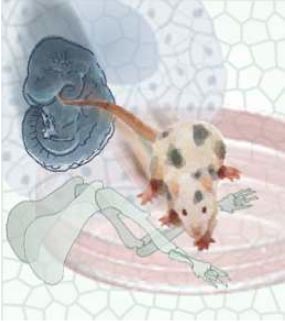Concept 41 DNA is only the beginning for understanding the human genome.

Although DNA transmits genetic information through time, it basically has a passive role. Proteins encoded by DNA actually carry out the myriad cellular reactions that constitute "life." Now that the Human Genome Project has provided us with a catalog of tens of thousands of genes, we are left with the question: "What do proteins made by these genes actually do?"
Scientists have always looked to mutant organisms to provide clues about protein function. Now, specific mutants can be created at will by inserting an altered or non-functioning copy of a gene back into a living organism, then looking for changes in behavior or development. Since mice breed quickly and share about 99% of their genes with humans, they have become the animal model of choice for large-scale functional studies. However, doing a single transgenic experiment is several orders of magnitude more difficult than sequencing the gene itself. The real work of understanding the human genome still lies ahead.
 DNA is packaged in a chromosome.
DNA is packaged in a chromosome. Higher cells incorporate an ancient chromosome.
Higher cells incorporate an ancient chromosome. Some DNA does not encode protein.
Some DNA does not encode protein. Some DNA can jump.
Some DNA can jump. Genes can be turned on and off.
Genes can be turned on and off. Genes can be moved between species.
Genes can be moved between species. DNA responds to signals from outside the cell.
DNA responds to signals from outside the cell. Different genes are active in different kinds of cells.
Different genes are active in different kinds of cells. Master genes control basic body plans.
Master genes control basic body plans. Development balances cell growth and death.
Development balances cell growth and death. A genome is an entire set of genes.
A genome is an entire set of genes. Living things share common genes.
Living things share common genes. DNA is only the beginning for understanding the human genome.
DNA is only the beginning for understanding the human genome.